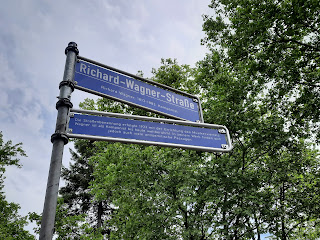In 2009, I wrote about the lack of a Mendelssohn Strasse in Freiburg, despite Freiburg being a progressive city, despite WWII having ended 64 years prior, despite the obvious anti-Semitism in the choice of composer street names. The surprise wasn't so much in the omission than in its lack of post-war correction. Indeed, in 2009, concert programs all over Germany were celebrating the 200th anniversary of Mendelssohn's birth; you'd think Freiburg would have done something about the absent street name.
Now it's 2022, and time for a two-part update.
Part One
On my way out of town for a long hike two days ago, I passed through the composers-street-names neighborhood, and glanced up in time to notice I was passing Richard-Wagner-Strasse. Many of Freiburg's street signs have supplementary signs with information about the individuals the streets are named for, but I didn't remember Richard-Wagner-Strasse having an explanatory sign in 2009. The interwebs tell me it was added in 2017.
Die Straßenbenennung erfolgte 1933 mit der Errichtung des Musikerviertels. Wagner ist als Komponist bis heute weltberühmt. In seinem Werk finden sich jedoch auch viele antisemitische Passagen.
The street was named in 1933 with the construction of the Musicians' Quarter. Wagner is world-famous as a composer to this day. In his work, however, many anti-Semitic passages are found.
It took 84 years, but way to go, Freiburg. I think this is even better than renaming the street.
Part Two
But what of the lack of a Mendelssohn Strasse? The Musicians Quarter still lacks one, but the absence has been addressed in a beautiful way.
When Freiburg's Hochschule fuer Musik (Music Academy) celebrated its 75th anniversary in November 2021--just eight months ago--the plaza in front of the academy was renamed Mendelssohn-Bartholdy-Plaza. I made it part of my walking route today.
The sign reads:
Familie Mendelssohn Bartholdy: Fanny 1805-1847, Felix 1809-1847, Carl 1838-1897. Felix und seine Frau Cécile verbrachten 1837 während ihrer Hochzeitsreise mehrere Wochen in Freiburg. Ihr Sohn Carl war von 1868 - 1873 Professor der Universität Freiburg.
Family Mendelssohn Bartholdy: Fanny 1805-1847, Felix 1809-1847, Carl 1838-1897. Felix and his wife Cécile spent several weeks in Freiburg during their honeymoon in 1837. Their son Carl was a professor at the University of Freiburg 1868-1873.
The sign does not mention that Fanny Hensel and Felix Mendelssohn Bartholdy were composers who are world famous to this day, I guess because that would be stating the obvious on a sign with limited space. It took 97 years--or 88 years, depending on how you count (either from the city's 1924 creation of a list of composer names for streets, or from the actual naming of the streets in 1933)--to correct the omission.










